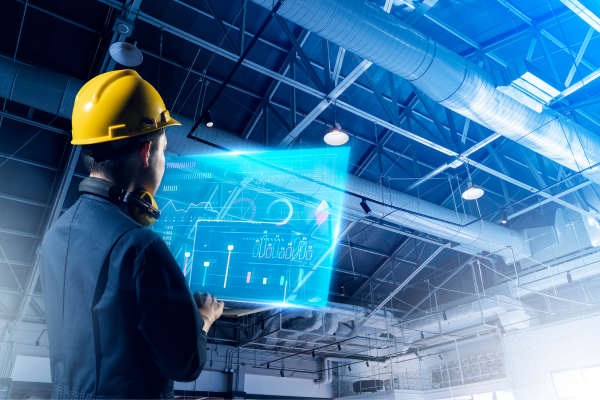August 18, 2023
The AI Revolution in Manufacturing: Unveiling Potential and Challenges
In the swiftly evolving landscape of manufacturing, Artificial Intelligence (AI) is positioned to play a pivotal role, poised to reshape the industry in profound ways. From automated decision-making to real-time optimization, AI’s impact is undeniable. In this comprehensive blog post, we explore how AI is on the brink of revolutionizing manufacturing while integrating crucial statistics that underscore its significance. Some questions that will be answered:
- How has AI already revolutionized the manufacturing industry?
- What is the future of AI in manufacturing?
- What are the positive effects of AI in manufacturing?
- What are the challenges of AI in manufacturing?

AI’s Impending Transformation of Manufacturing
The integration of AI into manufacturing is no longer a futuristic concept; it’s a present reality with transformative potential. Here’s an exploration of how AI is set to revolutionize the manufacturing industry:
1. Automated Decision-Making: The deployment of AI to automate decisions traditionally made by human workers is on the rise. These encompass critical aspects such as production scheduling, inventory management, and demand forecasting. This automation empowers human workers to concentrate on tasks that require creativity and strategic thinking.
2. Real-Time Optimization: Leveraging AI’s computational ability, manufacturing processes can be optimized in real-time. Factors like demand fluctuations, supply chain dynamics, and production costs can be dynamically accounted for, leading to unparalleled efficiency improvements and enhanced profitability.
3. Personalized Processes: AI has the potential to revolutionize product customization. By tailoring products to the specific preferences of individual customers, manufacturers can cater to a broader array of consumer demands, fostering customer loyalty and satisfaction.
4. Virtual Commissioning: AI-driven virtual simulations enable thorough testing and optimization prior to real-world implementation. This virtual commissioning mitigates risks, minimizes delays, and fine-tunes processes to achieve maximum efficiency.
5. Self-Driving Factories: The prospect of self-driving factories, where AI-powered machines and robots manage and execute operations autonomously, represents a remarkable paradigm shift. This holds the promise of unparalleled productivity gains and remarkable cost savings.
Crucial Statistics in Manufacturing
To provide a deeper understanding of AI’s impact, consider these significant statistics:
- A groundbreaking study reveals that 35% of companies are already leveraging AI in their processes, demonstrating the technology’s tangible impact on the industry.
- As manufacturers recognize AI’s potential, 42% of companies are actively exploring its integration for future implementation. This illustrates the eagerness to harness AI’s capabilities for manufacturing advancements.
- The financial implications of AI in manufacturing are staggering- AI’s market value in manufacturing is projected to skyrocket from $1.1 billion in 2020 to a monumental $16.7 billion by 2026.
- According to a compelling statistic, 61% of industrial manufacturing business leaders identify an increase in productivity as the most significant potential benefit of AI adoption. This underscores the role of AI in strengthening operational efficiency.
- Findings from the Manufacturing Institute underscore AI’s potential: AI-driven decision-support systems have the capacity to enhance manufacturing efficiency by an impressive margin of up to 20%.
Addressing Challenges on the AI Frontier
While AI’s potential in manufacturing is undeniably promising, several challenges demand attention:
1. Data Availability: Effective AI algorithms necessitate substantial datasets, a challenge in settings where data collection can be intricate and costly.
2. Technical Expertise: Developing and deploying AI solutions demands specialized skills, prompting manufacturers to bridge the expertise gap.
3. Worker Acceptance: Ensuring workers embrace AI in the workplace is essential. Educating and involving employees in AI integration is vital for harmonious adoption.
4. Regulation: As AI persists, regulatory frameworks must be established to ensure its ethical and safe application.
The Positive Impacts of AI in Manufacturing
Artificial intelligence brings forth a range of positive impacts for the manufacturing sector:
1. Enhanced Productivity: The automation of routine tasks elevates overall productivity by freeing human workers to engage in higher-value activities.
2. Superior Quality: AI’s ability to detect and correct defects in the early stages of manufacturing contributes to higher product quality.
3. Cost Efficiency: Automation and improved efficiency lead to cost reductions, benefiting manufacturers across the board.
4. Flexibility: AI-equipped processes can swiftly adapt to dynamic market demands, making manufacturing more agile and responsive.
5. Safety and Sustainability: AI ensures safer workplaces by monitoring equipment and preemptively identifying hazards. Furthermore, it aids sustainability efforts by optimizing resource utilization and energy consumption.
The Future Landscape of AI in Manufacturing
The future of AI is characterized by boundless innovation and disruption. Expect AI to redefine manufacturing technologies and contribute to additive manufacturing, robotics, and autonomous vehicles. Its role in enhancing efficiency and sustainability within manufacturing operations will be pivotal.
The era of AI-driven manufacturing is upon us, promising unprecedented transformation. While challenges persist, the potential benefits and undeniable statistics emphasize AI’s role in reshaping manufacturing. As AI technology evolves, manufacturing is poised to embrace a future marked by innovation, optimization, and sustainable growth.

